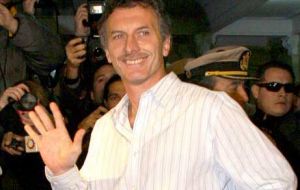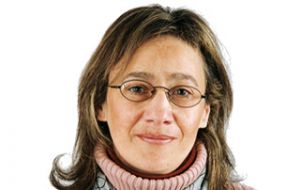MercoPress. South Atlantic News Agency
Double setback for President Kirchner electoral machine
 The time has come to talk less do more” said Mauricio Macri
The time has come to talk less do more” said Mauricio Macri Double setback for Argentine president Nestor Kirchner: in Buenos Aires City his hand picked mayor candidate was defeated by a landslide in the run off and in the extreme south province of Tierra del Fuego a woman belonging to the most fierce opposition group in Congress was elected governor.
In Buenos Aires Mauricio Macri, a Congressman and president of the Boca Juniors soccer team took 61% of the vote with Minister of Culture Daniel Filmus who had the full support of Kirchner's cabinet (and resources) trailed with 39%. But even impressive, it must also be remembered that in the first round of voting June 3, Macri garnered 46% of the vote and Filmus 24% "Thanks to everyone who voted today", Macri said to his supporters following Filmus's concession speech. "Thanks for helping consolidate our democracy and thanks for betting on hope and not on fear". However the real impact was 3.000 kilometres from Buenos Aires in the deep freezing south where Fabiana Rios who just scraped in the first round June 17, ended defeating the incumbent Tierra del Fuego governor Hugo Coccaro, 52% to 46%. Congress member Ms. Rios not only becomes the first woman governor in Argentina's history but actually defeated two Kirchner candidates. In the first round she knocked out to everybody's surprise the mayor of Ushuaia, a booming town of summer Antarctic cruises and with highly subsidized maquila industries. However in a province with strong local and federal patronizing (92.000 registered voters), Ms Rios was helped by the exposure of corruption scandals involving both Kirchner candidates. Her great virtue and talent was to convince the people of Tierra del Fuego not to be afraid to vote for a change, as happened when she was first voted into Congress in 1999 and then broke away from the collapsing administration of President De la Rua who resigned in the midst of the 2001/2002 crisis. Originally of Socialist roots she then joined Lilita Carrió and ARI, a Congress woman who has become Kirchner's fiercest opponent and specializes in exposing corruption cases. In the previous governor race Ms Rios was a distant third and this time a month ago forecasts were similar. She did manage however representatives in the Tierra del Fuego Council in 2003. But her 2007 shockwave victory is a significant blow to the powerful electorate machine of Kirchner and his two candidates. However Ms Rios was careful not to offend: the "historic day" for the people of Tierra del Fuego, for ARI (her party) also showed that "the people love ARI but also love very much President Kirchner". Governor Coccaro who must give up his office in January 2008 was also complaisant, "congratulations Fabiana, you won according to the rules", which is quite a compliment coming from a long established political machine. Ms Rios voting was impressive in Tierra del Fuego's two main cities, Rio Grande and Ushuaia. In Rio Grande she was only one per cent below Coccaro but in Ushuaia she had a 15 points lead. Going back to Argentina's capital, Macri whose soccer club won its sixth South American club championship last week is the son of a wealthy businessman who decided to pursue a career in politics after being kidnapped for 12 days in 1991. In 2003 he was defeated in his first mayoral race by Anibal Ibarra, another Kirchner-backed opponent. Two years later Macri was elected to Congress. Crime emerged as the biggest issue in the Buenos Aires campaign, with stories about robberies and murder often dominating local news in a city where the federal government controls the police. Macri proposed more funds for security and the creation of a ''crime map'' that police and citizens could use to focus police resources on the most problematic neighbourhoods. According to Argentine political analysts, Macri's victory and Ms. Rios in Tierra del Fuego may bolster Argentina's opposition as the Kirchner or his wife, Senator Cristina Fernandez de Kirchner, prepare to run for president in Argentina's October elections. Argentina's opposition has struggled as economic growth under Kirchner surged more than 8% annually over four years, and a victory by Macri could help unite the fractured parties. He takes office December 10. "Macri has an important following within the country's opposition but his challenge will be to become an alternative for Kirchner nationally", said Roberto Bacman, who runs the Center of Public Opinion Studies in Buenos Aires. President Kirchner's image has also suffered in recent weeks as power shortages caused by cold weather and lack of investment in energy infrastructure forced rationing to homes and businesses across the country. The president's efforts to stem South America's second-highest inflation rate with price controls also led to shortages of beef and milk in markets this year while a corruption scandal involving the construction of a gas pipeline led Kirchner to dismiss two government officials last month. But the Kirchner team did not interpret the Buenos Aires City landslide as a defeat. The administration's lightning rod, cabinet chief Anibal Fernandez, said that actually the support for Kirchner in the city has been steadily growing from 19% in 2003, to Bielsa's 21% in 2005 and now "to 40% with Filmus".





Top Comments
Disclaimer & comment rulesCommenting for this story is now closed.
If you have a Facebook account, become a fan and comment on our Facebook Page!